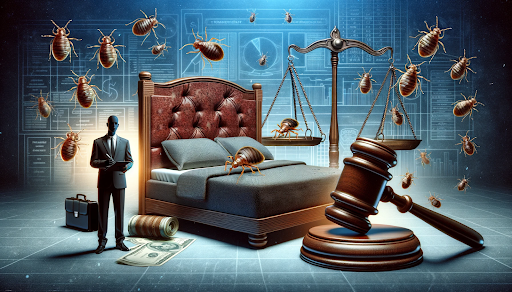Dealing with bed bugs can be an unpleasant experience, especially when staying at a hotel. If you’ve been bitten by these pests during your stay, you might wonder whether it’s possible to claim compensation from the hotel. In many cases, guests who have suffered from bed bug bites may be eligible for compensation, especially if the hotel failed in its duty of care to prevent infestations and maintain a safe environment for its guests.
Understanding your legal rights is crucial when seeking compensation for bed bug bites from a hotel. The litigation process can be complex, and proving negligence on the part of the hotel is often necessary to receive compensation. It’s essential to gather adequate evidence of the infestation and your resulting damages, such as medical expenses, physical discomfort, and property damage.
When considering whether to pursue compensation, it’s important to know that not every bed bug case will be successful. Factors like the severity of the infestation, the hotel’s response to your complaint, and the quality of the evidence you can present will all impact the outcome of your claim. Nonetheless, being well-informed about your rights and the legal options available to you can make a significant difference in the pursuit of justice and fair compensation.
Understanding Bed Bug Infestations in Hotels
Identifying Bed Bug Presence
Bed bug infestations in hotels can be a significant issue, as they are easily spread due to high guest turnover. Identifying their presence is crucial for both hotel management and guests. Bed bugs are small, brownish insects that feed on human blood. They are usually found in bedding, mattresses, and other furniture items. Signs of bed bug infestations include:
- Visual evidence: Bed bugs, their eggs, or their exoskeletons visible on bedding, furniture, or walls.
- Bite marks: Small, red bumps on the skin that often appear in clusters or lines.
- Blood stains: Small, dark red stains on sheets, pillows, or mattresses.
- Fecal spots: Tiny black or brown spots on bedding or walls, which are bed bug excrement.
If you suspect a bed bug infestation, contact the hotel management and request a pest control inspection.
Health Implications and Personal Harm
While bed bugs are not known to transmit diseases, their bites can cause discomfort, itching, and allergic reactions in some individuals. The constant scratching of these itchy bites can lead to skin infections and scarring.
In addition to physical harm, bed bug infestations can also affect one’s mental health. The distress caused by dealing with bed bugs, coupled with disrupted sleep, can lead to anxiety, stress, and insomnia.
It is essential for hotels to take immediate action to address bed bug infestations, as ignoring the problem can result in serious health implications for guests and potential legal consequences for the establishment.
Legal Aspects and Compensation Claims
Filing a Complaint and Collecting Evidence
If you experience bed bug bites during your stay at a hotel, it is crucial to file a complaint and collect evidence. Start by notifying the hotel management immediately and taking photos of any visible bed bug infestations or bite marks. Keep track of any expenses you incur, such as medical treatment, replacing personal items, or costs associated with professional bed bug extermination.
It’s also essential to gather and preserve the following types of evidence:
- Photos of the infested room, including bed, furniture, and any visible bugs or eggs.
- Medical records detailing examinations, diagnoses, and treatments related to bed bug bites.
- Receipts for expenses incurred due to the infestation, such as property damage, medical bills, and hotel costs.
- Witness statements, if available, from other hotel guests that faced similar issues.
Hotel Liability and Pursuing a Lawsuit
When considering legal action against a hotel, it’s important to understand the concept of premises liability. Hotels have a legal obligation to provide safe and sanitary accommodations for their guests. If a hotel fails to do so, they can be held liable for negligence, and any pain and suffering, property damage, or medical expenses guests may experience as a result of a bed bug infestation.
In order to pursue a successful lawsuit against the hotel, you must prove:
- The hotel’s knowledge of the bed bug infestation, or that they should have known about it.
- Negligence on the part of the hotel in failing to address the issue or warn guests.
- Direct link between the hotel’s negligence and the harm caused to the guest.
Having a qualified attorney who specializes in bed bug law is crucial to navigating the complexities of pursuing a claim. They can provide guidance on whether to pursue a lawsuit, and if so, help compile the necessary documentation, evidence, and legal strategy.
Compensation for bed bug bites can include both monetary and non-monetary damages. Monetary damages cover actual expenses or losses incurred, while non-monetary damages encompass pain and suffering, psychological distress, and loss of enjoyment of life.
Settlements in bed bug cases have ranged from $25,000 to $500,000; however, every case is unique, and results vary based on the circumstances involved. It is important to be realistic about the potential outcome and work with an experienced lawyer to achieve the best possible resolution.
In Conclusion
When dealing with bed bug infestations at a hotel, it is crucial to understand the types of compensation a guest may be entitled to. Typically, hotel bed bug compensation includes both monetary and non-monetary forms.
Monetary compensation can cover various expenses, such as:
- Medical bills for treating bed bug bites
- Costs of replacing damaged personal items
- Lost wages due to time off work to address the issue
Non-monetary compensation may consist of:
- Complimentary hotel stays or upgrades
- Apologies and assurances that the issue will be addressed
Upon discovering bed bug infestations, it is essential to collect evidence of their presence by inspecting mattresses, box springs, and pillowcases for bed bugs, eggs, shed skins, and droppings. Documentation through pictures and written accounts can strengthen a claim.
If a hotel denies liability or refuses to provide adequate compensation, the guest may consider pursuing a lawsuit. In such cases, a demand letter outlining the damages suffered and a request for fair compensation should be sent to the hotel. Should the hotel’s response remain unsatisfactory, it is advisable to consult with a legal professional specializing in bed bug litigation.
In summary, guests affected by bed bug infestations in a hotel have the right to seek compensation for their suffering and losses. By understanding their entitlements and following proper procedures, they can achieve a fair resolution to the issue.
You May Also Like: Nepal’s Top 5 Luxury Holiday To Explore Beautiful Himalayas



